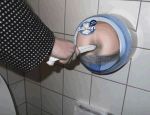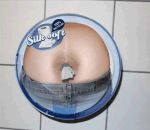Engineers investigating a problem with the system, which processes urine into clean water for drinking, said they believed the cause for the back-up was a high concentration of calcium in the astronauts' urine.
Scientists do not yet know if the high calcium concentration is due to bone loss, a consequence of living in a zero-gravity environment, or other factors.
"We've learned a lot more about urine than we ever needed or wanted to know - some of us anyway," said David Korth, the station flight director.
The £62 billion space station project involving 16 nations has been under construction 220 miles above the Earth for more than a decade.
Before the urine recycler was started up in November 2008, it was fully tested by Nasa.
"Folks had good knowledge of the content of the urine going in, but the chemistry changes as it works through the processor are not always understood," said Julie Robinson, a scientist working on the project. "There are a lot of parameters including urine calcium and pH (acidity) that everyone is looking at."
Engineers at the Marshall Space Flight Center in Huntsville, Alabama, are hoping to come up with a fix in time to fly replacement parts out on the shuttle Endeavour, which is scheduled for launch on Feb 7 on a construction mission.







